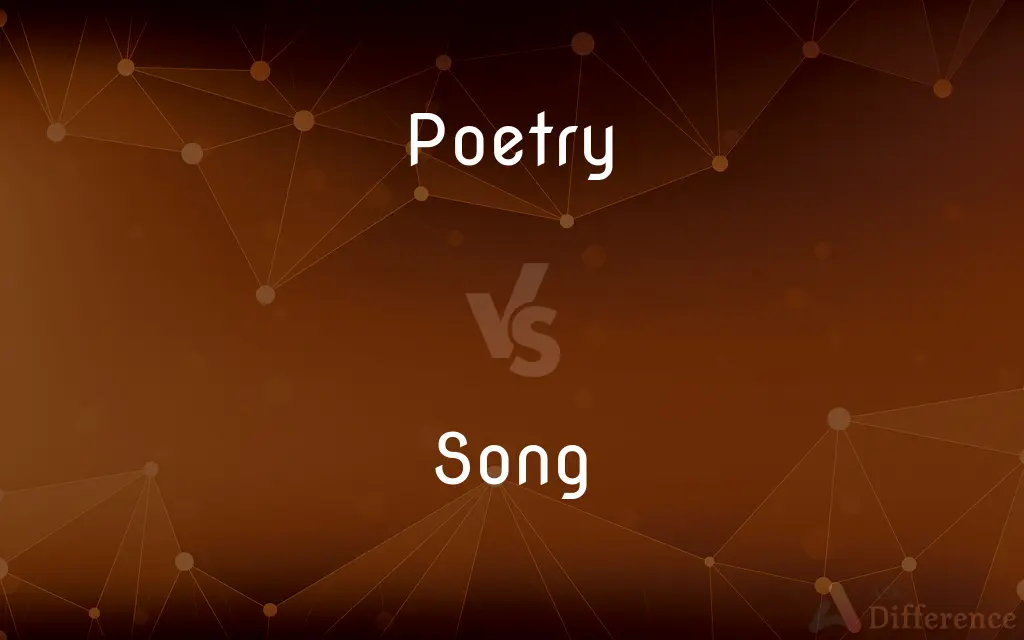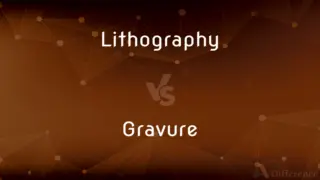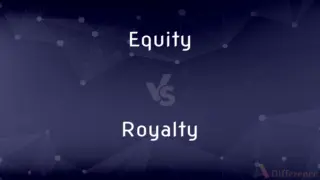Poetry vs. Song — What's the Difference?
By Tayyaba Rehman & Maham Liaqat — Updated on March 30, 2024
Poetry is a form of literary art that emphasizes expressive language, often without music, while a song combines lyrics with musical composition for performance.

Difference Between Poetry and Song
Table of Contents
ADVERTISEMENT
Key Differences
Poetry, as a literary form, focuses on the expression of ideas, emotions, and narratives through structured verses, utilizing stylistic devices like meter, rhyme, and metaphor. It is intended to be read, either silently or aloud, and places a strong emphasis on language and imagery to evoke reactions from its audience. On the other hand, a song is a musical composition that blends lyrics (words) with melodies, rhythm, and often instrumental accompaniment, designed to be sung or performed.
While poetry often adheres to traditional forms and structures, such as sonnets or haikus, and values the aesthetic qualities of words and their arrangement, songs prioritize musicality alongside lyrical content. The melody and harmony in songs serve to enhance the emotional resonance of the lyrics, creating an integrated experience that engages both the auditory senses and the mind. Whereas, the power of poetry lies in its ability to conjure vivid imagery and provoke thought through the written word alone.
Songs and poetry both serve as mediums for storytelling and emotional expression, but they do so through different channels. Poetry relies on the reader's imagination and interpretation to fill in the sensory details and emotional depth, making it a more introspective and solitary experience. Conversely, songs deliver a more direct emotional impact through music, which can amplify the feelings conveyed by the lyrics, making the experience more communal and immediate.
The creation of poetry is primarily a solitary act, focusing on the individual poet’s use of language to express personal or universal truths. Songwriting, while it can also be a solitary endeavor, often involves collaboration between lyricists, composers, and performers, highlighting the interplay between words and music in crafting a piece that resonates with listeners.
Despite their differences, the boundary between poetry and songs can sometimes blur, especially in genres like rap, where the rhythmic and lyrical complexity mirrors that of traditional poetry. Both forms of expression share a deep historical connection, with the earliest poems often being recited or sung to musical accompaniments, suggesting that the distinction between them is more a matter of form and presentation than of essence.
ADVERTISEMENT
Comparison Chart
Medium
Textual, focused on written words.
Musical, combines lyrics with melodies.
Primary Focus
Language, imagery, and form.
Melody, rhythm, and lyrical content.
Performance
Read aloud or silently.
Sung or played with musical instruments.
Sensory Engagement
Evokes imagery and emotions through language.
Engages auditory senses with music.
Collaboration
Often a solitary creation.
Frequently involves multiple creators (lyricists, musicians).
Compare with Definitions
Poetry
Structured literary expression focusing on aesthetic and rhythmic qualities of language.
The poet recited verses about love and loss.
Song
A short musical piece with verses and often a repeating chorus.
The children's song was simple yet catchy.
Poetry
A written or spoken work that emphasizes imagery, metaphor, and sound.
His poetry often explores themes of nature and humanity.
Song
An artistic form that combines poetry with music to tell a story.
His songwriting has won numerous awards for its emotional depth.
Poetry
An art form that conveys emotions and ideas through the strategic arrangement of words.
She found solace in the poetry of Maya Angelou.
Song
A recorded or performed piece of music with vocal elements.
The concert concluded with a song dedicated to peace.
Poetry
A collection of poems by a single author or multiple authors.
Her latest book of poetry has been nominated for an award.
Song
Lyrics set to music, creating a harmonious and rhythmic piece.
She sang a song that expressed her feelings perfectly.
Poetry
Compact language designed to provoke thought and feeling.
The poetry slam featured powerful performances that moved the audience.
Song
A musical composition for voice(s), often accompanied by instruments.
The band's new song topped the charts for weeks.
Poetry
Poetry (derived from the Greek poiesis, "making") is a form of literature that uses aesthetic and often rhythmic qualities of language—such as phonaesthetics, sound symbolism, and metre—to evoke meanings in addition to, or in place of, the prosaic ostensible meaning. Poetry has a long and varied history, evolving differentially across the globe.
Song
A song is a musical composition intended to be performed by the human voice. This is often done at distinct and fixed pitches (melodies) using patterns of sound and silence.
Poetry
The act or practice of composing poems.
Song
A dynasty that ruled in China AD 960–1279.
Poetry
Poems regarded as forming a division of literature.
Song
A brief composition written or adapted for singing.
Poetry
The poetic works of a given author, group, nation, or kind.
Song
The act or art of singing
Broke into song.
Poetry
Literature written in meter; verse.
Song
A distinctive or characteristic sound made by an animal, such as a bird or an insect.
Poetry
Prose that resembles a poem in some respect, as in vivid imagery or rhythmic sound.
Song
Poetry; verse.
Poetry
The essence or characteristic quality of a poem
"It is impossible to separate the 'poetry' in Paradise Lost from the peculiar doctrines that it enshrines" (T.S. Eliot).
Song
A lyric poem or ballad.
Poetry
A quality that suggests poetry, as in grace, beauty, or harmony
The poetry of the dancer's movements.
Song
A musical composition with lyrics for voice or voices, performed by singing.
Thomas listened to his favorite song on the radio yesterday.
Poetry
Literature composed in verse or language exhibiting conscious attention to patterns and rhythm.
Song
(by extension) Any musical composition.
Poetry
A poet's literary production.
Song
Poetical composition; poetry; verse.
Poetry
(figurative) An artistic quality that appeals to or evokes the emotions, in any medium; something having such a quality.
That 'Swan Lake' choreography is poetry in motion, fitting the musical poetry of Tchaikovski's divine score well beyond the literary inspiration.
Song
The act or art of singing.
Poetry
The art of apprehending and interpreting ideas by the faculty of imagination; the art of idealizing in thought and in expression.
For poetry is the blossom and the fragrance of all human knowledge, human thoughts, human passions, emotions, language.
Song
A melodious sound made by a bird, insect, whale or other animal.
I love hearing the song of canary birds.
Poetry
Imaginative language or composition, whether expressed rhythmically or in prose. Specifically: Metrical composition; verse; rhyme; poems collectively; as, heroic poetry; dramatic poetry; lyric or Pindaric poetry.
She taketh most delightIn music, instruments, and poetry.
Song
(ornithology) The distinctive sound that a male bird utters to attract a mate or to protect his territory; contrasts with call; also, similar vocalisations made by female birds.
Poetry
Literature in metrical form
Song
A low price, especially one under the expected value; chiefly in for a song.
He bought that car for a song.
Poetry
Any communication resembling poetry in beauty or the evocation of feeling
Song
An object of derision; a laughing stock.
Song
That which is sung or uttered with musical modulations of the voice, whether of a human being or of a bird, insect, etc.
Song
A lyrical poem adapted to vocal music; a ballad.
Song
More generally, any poetical strain; a poem.
The bard that first adorned our native tongueTuned to his British lyre this ancient song.
Song
Poetical composition; poetry; verse.
This subject for heroic song.
Song
An object of derision; a laughingstock.
And now am I their song, yea, I am their byword.
Song
A trifle; an insignificant sum of money; as, he bought it for a song.
Song
A short musical composition with words;
A successful musical must have at least three good songs
Song
A distinctive or characteristic sound;
The song of bullets was in the air
The song of the wind
The wheels sang their song as the train rocketed ahead
Song
The act of singing;
With a shout and a song they marched up to the gates
Song
The characteristic sound produced by a bird;
A bird will not learn its song unless it hears it at an early age
Song
A very small sum;
He bought it for a song
Song
The imperial dynasty of China from 960 to 1279; noted for art and literature and philosophy
Common Curiosities
Can poems be turned into songs?
Yes, many poems have been successfully adapted into songs, with musical compositions added to the original text.
Can a song exist without lyrics?
Yes, instrumental pieces are considered songs without lyrics, focusing solely on musical composition.
How do songs convey emotion differently from poetry?
Songs leverage melody, harmony, and rhythm in addition to words to evoke emotions, potentially creating a more immediate emotional connection.
How has technology affected the creation and distribution of poetry and songs?
Technology has expanded the reach and accessibility of both poetry and songs, enabling easier creation, distribution, and consumption through digital platforms.
Can poetry and songs serve as historical documents?
Yes, both forms can capture the emotions, events, and cultural conditions of their time, serving as valuable historical records.
What is the main difference between poetry and songs?
The main difference lies in their presentation: poetry is primarily written and read, focusing on language and imagery, while songs are performed, combining lyrics with music.
Is rap considered poetry or a song?
Rap blurs the lines between poetry and songs, incorporating the rhythmic and lyrical complexity of poetry with musical elements, making it a form of both.
Why is poetry important?
Poetry is important for its ability to express complex feelings and ideas in a condensed and powerful form, encouraging reflection and emotional response.
Do all cultures have a distinction between poetry and songs?
The distinction varies by culture, with some viewing them as closely intertwined and others as separate art forms.
What role do poetry and songs play in education?
They are used to enhance literacy, cultural understanding, and emotional intelligence, fostering creativity and critical thinking.
What are the challenges in writing poetry and songs?
Challenges include finding original expression, balancing form and content, and connecting with the intended audience.
What makes a song memorable?
A memorable song often features a catchy melody, relatable lyrics, and emotional depth that resonates with listeners.
What is the future of poetry and songs?
The future likely involves further blurring of boundaries between the two, with continued innovation in how they are created, shared, and experienced.
How do poets and songwriters gain inspiration?
Inspiration can come from personal experiences, observations of nature and society, emotions, and the work of other artists.
How do poetry and songs influence society?
They can influence society by highlighting social issues, shaping public opinion, and inspiring movements for change.
Share Your Discovery

Previous Comparison
Lithography vs. Gravure
Next Comparison
Equity vs. RoyaltyAuthor Spotlight
Written by
Tayyaba RehmanTayyaba Rehman is a distinguished writer, currently serving as a primary contributor to askdifference.com. As a researcher in semantics and etymology, Tayyaba's passion for the complexity of languages and their distinctions has found a perfect home on the platform. Tayyaba delves into the intricacies of language, distinguishing between commonly confused words and phrases, thereby providing clarity for readers worldwide.
Co-written by
Maham Liaqat













































